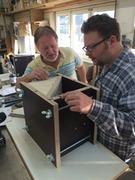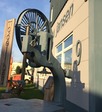- What we do
- Institutional investors
- Equity products
- AI Co-Investment Facility
- Cleantech Co-Investment Facility
- Impact investing at the EIF
- Climate & Infrastructure Funds
- Technology Transfer
- European Angels Fund (EAF) - Co-investments with Business Angels
- Venture capital
- The Social Impact Accelerator (SIA)
- Lower mid-market
- Mezzanine Facility for Growth
- VentureEU
- EFSI Equity instrument
- Single EU Equity Financial Instrument
- Private equity secondary market transactions
- EIF-NPI Equity Platform
- ESCALAR Programme
- Debt products
- New ESIF ERDF Guarantee Fund initiative in Greece
- EFSI Private Credit Programme
- AGRI Guarantee Facility
- AGRI Italy Platform Uncapped Guarantee Instrument
- Credit enhancement
- Cultural and Creative Sectors Guarantee Facility (CCS GF)
- ENSI - Securitisation Initiative
- Erasmus+ Master Loan Guarantee Facility
- Skills & Education Guarantee Pilot
- EREM debt products
- Single EU Debt Financial Instrument
- Documentary Finance Facility – Bulgaria
- The SME Initiative
- Inclusive finance
- European Fund for Strategic Investments (EFSI)
- Regional Development - Country and sector-specific initiatives
- Normandie Garantie Agri
- FAIRE - La Réunion
- Auvergne Rhône-Alpes FEADER
- Recovery Equity Fund of Funds of Bulgaria
- Fons d’Inversió en Tecnologia Avançada (FITA) Catalonia
- Dutch Future Fund (DFF)
- Dutch Alternative Credit Instrument (DACI)
- PORTUGAL BLUE: a new initiative for blue economy investments
- JEREMIE Greece Reflows – Business Angels’ Co-Investment Equity Instrument
- German Corona Matching Facility (CMF)
- Portugal Growth programme
- Central and Eastern European Technology Transfer (CEETT)
- Croatian Growth Investment Programme (CROGIP) II
- Croatian Growth Investment Programme (CROGIP)
- Croatian Venture Capital Initiative 2 (CVCi 2)
- AGRI Italy Platform Uncapped Guarantee Instrument
- DISPOSITIF INSTRUMENTS FINANCIERS BOURGOGNE FRANCHE-COMTÉ
- ALTER’NA – ESIF EARFD Nouvelle-Aquitaine
- Baltic Innovation Fund 1 (BIF 1)
- Baltic Innovation Fund 2 (BIF 2)
- Central Europe Fund of Funds (CEFoF)
- Croatian Venture Capital Initiative (CVCi FoF)
- Competitiveness Fund-of-Funds for SMEs in Romania
- The Cyprus Entrepreneurship Fund (CYPEF)
- Deep and Comprehensive Free Trade Area Initiative East Guarantee Facility (DCFTA)
- EU4Business Capped Guarantee
- Dutch Growth Co-Investment Programme
- Dutch Venture Initiative (DVI-II)
- ESIF Fund-of-Funds Greece
- EAFRD FoF Portugal
- EAFRD FoF Romania
- The ERP-EIF Facility
- ERP-EIF Co-Investment Growth Facility
- The LfA-EIF Facilities
- The German Future Fund (GFF) - EIF Growth Facility
- INAF – French National Agricultural Initiative
- ESIF Energy Efficiency and Renewable Energy Malta
- Regional Fund-of-Funds Romania
- ESIF Fund-of-Funds Czech Republic
- The Silesia EIF Fund of Funds
- La Financière Région Réunion
- The EIB Group Risk Enhancement Mandate (EREM)
- EstFund
- Call for Expression of Interest for FOSTER II
- Greater Anatolia Guarantee Facility (GAGF)
- G43 - Anatolian Venture Capital Fund Project
- InvestBG Equity Instrument
- JEREMIE
- Romania Recovery Equity Fund of Funds
- JEREMIE Romania Reflows – Equity Instrument
- Luxembourg Future Fund 1 (LFF)
- Luxembourg Future Fund 2
- Mezzanine 'Fund of Fund' for Germany (MDD)
- NEOTEC resources
- Polish Growth Fund of Funds (PGFF)
- Portugal Venture Capital Initiative (PVCi)
- Scottish-European Growth Co-Investment Programme
- Slovene Equity Growth Investment Programme (SEGIP)
- Swedish Venture Initiative (SVI)
- Turkish Growth and Innovation Fund (TGIF)
- Western Balkans Enterprise Development & Innovation Facility (WB EDIF)
- EAFRD FoF Greece
- Irish Innovation Seed Fund (IISF)
- RRF Czech Republic Fund of Funds
How EFSI benefits SMEs in Europe - Kreissparkasse, CMZRB and CIBANK case studies

When the Rhine feeds its tributaries
The Düssel curves around the village of Gruiten as it meanders through the valley where the first specimen of Neanderthal man was excavated. Before it reaches the Rhine only 17 kilometres away, the river splits into four different streams.
A map of these final, convoluted stretches of the Düssel looks somewhat like a diagram of the loan Simone Wilbs and her husband Sebastian received to finance their family business in Gruiten, an intricate structure of guarantees and counter-guarantees. The big European institutions and German banks that are ultimately behind the loan believe that, just as the little river feeds the Rhine, small enterprises like the Wilbs’s metal-moulding factory must survive for the larger economy around it to prosper.
That makes the lifeline the Wilbs’s received important beyond the livelihoods of the small group of people who work at their company—though it certainly is vital in that case “If we didn’t have the loan, we would have no business,” says Simone Wilbs, who works alongside her husband, two full-time employees (including her brother-in-law), and three part-time workers, one of which is the founder of the business, her father.
“It’s not a big business. It’s a family business. But we still have to have money at the end of the month to pay our workers, while we wait for customers to pay us.”
The European Investment Fund (EIF), which helped finance the Wilbs’s EUR 30,000 credit, promotes financing across Europe for small businesses. Since 2015 a programme the EIF manages for the European Commission, called COSME, has benefitted from the backing of the European Fund for Strategic Investments. Known as EFSI, that’s a joint programme of the Commission and the European Investment Bank Group, the EIF’s parent organisation. EFSI’s backing allows the EIF-run programme to double the amount of loans it guarantees.
The big river feeds the streams

EFSI aims to generate EUR 315 billion in new investment by 2018 with initial money from the EIB Group and the European Commission. The EIF’s portion of that is EUR 5 billion of capital, which should mobilise EUR 75 billion of investment into small and midsized businesses. Let’s call that the Rhine helping many little Düssels flow into it.
Some of the EIB Group’s deals under EFSI are somewhat difficult to understand for the layman, because they involve complicated assessments of risk and relatively new financial structures. With the EIF, the EFSI programme is easier to grasp. The EIF finds ways to get money to small businesses indirectly through banks and other institutions. The EFSI guarantee simply enables the EIF’s counterparts to lend or guarantee the money twice as fast.
Risks shared, loans made

The loan the Wilbs family business received is part of a programme on which the EIF’s deals under EFSI are based across Europe. This COSME programme (whose name is an acronym for Competitiveness of Enterprises and Small and Medium-sized Enterprises) guarantees either loans or other loan guarantees.
Here’s how that worked with the Wilbs loan:
- Simone and Sebastian went to their local bank, Kreissparkasse, for the loan
- Kreissparkasse accessed a loan (under a programme called ERP-Gruenderkredit StartGeld) from KfW, the big German development bank. KfW took 80% of Kreissparkasse’s risk.
- KfW received a counter-guarantee from the EIF through the COSME programme. The counter-guarantee took half KfW’s risk and shipped it along to the EIF
The result is that Kreissparkasse, the bank which actually lent to the small business, has to worry much less about the risk of the loan. Of course, that makes the bank much more likely actually to make the loan—and that’s good for the small and midsized businesses where most Europeans work.
“This kind of credit plays a vitally important role for start-ups and young businesses,” says Lars Testorf, a vice president in product management for KfW in Frankfurt. “Without it, a lot of small businesses would be told, ‘No,’ by their bank.”
With KfW, the EIF signed a deal to support EUR 1 billion of loans to start-ups in Germany by 2018. That could mean that more than 20,000 German start-ups will benefit. Without EFSI, the EIF would not have had the resources in its COSME programme to make such a deal in 2015.
“EFSI is extremely important,” says Testorf, whose bank signed its deal with the EIF in September and started making loans to start-ups in December. “We couldn’t do these kinds of loans without it.”
A market gap filled

Loans are hard to get for small businesses across Europe. Banks have plenty of money on hand, but perceive smaller companies as bigger risks than large ones. The aim of EFSI—from its involvement with small businesses like the Gruiten factory to massive investments in offshore wind farms—is to make banks and private investors feel more secure about putting their money to work.
That’s important in the Czech Republic, where the EIF signed a deal in August to counter-guarantee the guarantees made by CMZRB, a state-owned development bank based in Prague. “There’s enough liquidity, but banks require collateral, and that’s missing,” says Lubomir Rajdl, deputy chief executive of the Czech bank. “Our programme is really filling a market gap.”
By year-end CMZRB already guaranteed loans for 400 small businesses in the Czech Republic with the backing of the EIF. “This was an excellent year,” Rajdl says. “The COSME guarantee backed by EFSI made it possible.”
In the next two years Rajdl expects the programme will support loans to a total of 1400 small businesses with a value of EUR 160 million.
…and on the Danube too
These small loans extend the reach of EFSI to every corner of Europe. On the Bulgarian bank of the Danube across from Romania, Georgi Dikov runs a factory that makes scaffolding and construction equipment. He received a EUR 34,000 loan from Cibank in Sofia, for the purchase of a second-hand harvester from Germany.
“In Bulgaria it’s good to have more than one source of revenue,” says Dikov, who employs 45 people in his factory and five others working in a 100-hectare plot of agricultural land. “If things are not so good with one business, the other one supports it until things get better.”
The 39-year-old Dikov’s firm, Dzhodi Ltd., is located in Oryahovo, a town of 5,000 people where the unemployment rate is higher than the Bulgarian average and wages are half the national average. It’s an area with relatively few highly trained workers.
“I train people with no education,” says Dikov, “and I turn them into specialists.”
CIBANK’s first 104 loans under the EFSI guarantee amount to EUR 17.7 million. By the end of the EUR 100 million programme, CIBANK officials expect to support between 650 and 700 small and mid-sized businesses in Bulgaria.
Whether it’s on the banks of the Rhine or the Danube, EFSI backing for the COSME programme is already keeping Europe’s economy flowing.
We use cookies to give the best browser experience on our website. or change cookie settings.
Copyright ©
European Investment Fund – The European Investment Fund is not responsible for the content of external internet sites.


